Household cleaning products
Take Action Today, Put Them Away
A programme to prevent poisoning from household products
View some real life examples through the
RoSPA Virtual Safety Kitchen
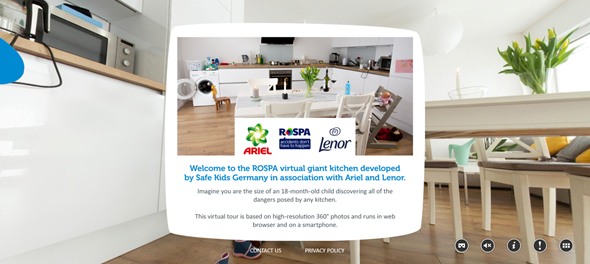
Developed by Safe Kids Germany in association with Ariel and Lenor.
Explore the virtual kitchen
What is the problem?
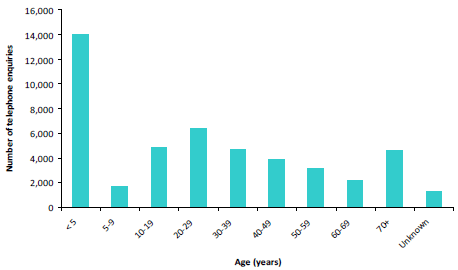
Many parents and health visitors will be all too aware of the injury, distress and misery that results from a child ingesting a household cleaning product or medication. Many thousands of children end up in hospital each year because of one of these incidents. Due to their inquisitive nature, children under five-years-old are most at risk, with the peak for these type of incidents being at two to three years of age. In fact poisoning is number three in the five largest causes of accidents-related hospital admissions for children under the age of five.
- Most accidental poisoning happens to children younger than five years old, with children aged one to three years being most at risk
- On average 15 under fives are admitted to hospital each day due to suspected poisoning
- Children from the poorest families are three times more likely to be admitted to hospital due to an accident, including accidental poisoning.
Why young children are more likely to be poisoned?
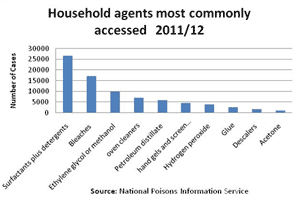
- Exploring is part of growing up but young children have little concept of potential dangers
- They are inquisitive and will often put things in their mouth to further explore their texture and taste
- Part of growing up is to watch and copy what others do, unfortunately this includes copying using potentially dangerous things like household products and medication
- Small children may mistake liquid capsule style dishwasher and washing machine detergents for toys or sweets. These are not only a danger in relation to ingestion but can also cause serious irritation to the eyes which can result in long term damage.
How can accidents with household cleaning products be prevented?
- Closely supervise children in and around the home
- Keep household chemicals out of sight and reach of children, preferably in a locked cupboard. Remember this also applies to the garage and shed
- Always store household cleaning chemicals in their original containers
- Replace lids and put all products away immediately after use
- Dispose of unwanted household cleaning products safely
- Store household cleaning products in a different place from food and medicine
- Use household cleaning products according to label directions
- Mixing household products can cause dangerous gases to form.
For more information on how to prevent poisoning accidents including those caused by medication, plants and household products, download the factsheet here.
Take Action Today – The story so far
Over the last five years RoSPA has been delighted to be working with the UK Cleaning Products Industry (UKCPI) to deliver the Take Action Today Put Them Away campaign to reduce accidental poisoning to under-fives, with targeted campaigns in 12 areas across the UK. Around 400,000 families have benefitted from receiving safety advice in the form of a handy magnetic fridge pad which gives them clear advice on how to prevent poisoning in their homes, as well as being a great conversation starter for health visitors and other professionals to use in raising the subject. The pads are accompanied by factsheets, checklists and briefing notes which help to ensure consistent and clear messages reach as many families in the target area as possible.
The results are exciting. Although it hasn’t been possible to track A&E data in all areas where the campaign has been delivered, early pilot sites in Birmingham and Liverpool showed a significant drop in incidences reported by hospitals following the programme. Equally important, family surveys have shown a significant change in the way families store products following the campaign, and over 80% of respondents indicated that they would pass on the safety messages to their friends and family.
To find out more about the results of the programme so far you can read the evaluation document.
Case Studies

Gemma Duke
"I've never heard him scream like it and I hope I never will again."
Read Gemma's story
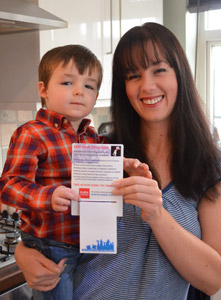
Birmingham mum-of-two Gemma Duke, from Birmingham, is supporting the campaign after her two-year-old son Zachary squeezed a liquid laundry capsule in his eyes in July.
Gemma Duke, aged 31, said: "It is so important for parents to take note of these safety messages as it only takes a moment for a child to grab a cleaning product.
"I left a liquid laundry capsule in the washing machine drum, ready for the next wash, and Zachary picked it up and squeezed it in both of his eyes. I've never heard him scream like it and I hope I never will again."
Gemma washed the liquid out of his eyes and took him to the Midland Eye Centre, in Winson Green, where Zachary had tests on his eyes, an eye wash with a saline fluid and antibiotics before being given the all clear.
"Thankfully, there was no lasting damage but the experience was traumatic," added Gemma Duke. "I had to hold Zachary down while a nurse washed his eyes out with two litres of liquid. It was a horrendous experience for a mother to go through and the poor lamb looked so upset. Although the procedure took 25 minutes, it felt like forever.
"I always had cupboard locks in the kitchen and kept cleaning products high up, out of reach from the children, but on top of that now, I never leave a liquid laundry capsule in the washing machine as toddlers especially can get their hands on anything.
"Zachary doesn't have any eye damage but the experience affected him and he is wary of going near the washing machine. It isn't worth the risk and I hope other parents will remember this important advice."
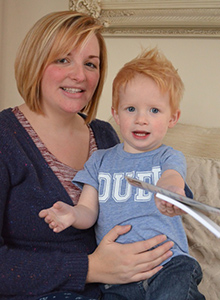
Mum-of-three Roxanne Tomkinson, from Cradley Heath, near Dudley in the West Midlands.
Roxanne Tomkinson was pregnant with her third child and getting her two sons ready to go out when she nipped to the toilet. Moments later, she heard screaming and discovered her 22-month-old son Hayden had bitten into a liquid laundry capsule and sucked out its contents.
"It happened so quickly," said the 25-year-old hairdresser. "I flew down the stairs and found Hayden doubled over in pain and his four-year-old brother screaming.
"Hayden vomited three times and I was in such a panic waiting for the ambulance to arrive. After he had been sick, he started to get better and back to his cheeky self, which was a relief, but he needed some checks at A&E as the doctors were concerned he may have suffered burns to his mouth, but luckily he hadn’t.
"It only took the briefest of moments for Hayden to get into the kitchen cupboard under the sink and go straight for a liquid laundry capsule. When it happened in August 2013, I'd just had a new kitchen fitted and hadn’t got round to putting locks or safety catches on the cupboards.
"It was one of the scariest experiences of my life and since that day, all the household cleaning products are high up and out of reach of the children. I hope other parents will take note of the important advice in the Take Action Today, Put Them Away campaign."
Growing the programme across the North West
RoSPA has now been given the opportunity to work with Fairy non-bio to spread the Take Action Today programme right across the North West region. This is a major opportunity to raise awareness of the need to keep children safe from accidental poisoning and eye injury, and we are keen to work with local health visitor services to make sure that we reach as many families as possible. The programme is designed to support the work that health visitors and other local partners already do in supporting families by providing materials, free of charge, that can help to raise this issue during scheduled visits and contacts. The programme is scheduled to roll out across the North West during 2019.
Interested in becoming a partner with RoSPA to deliver a local programme?
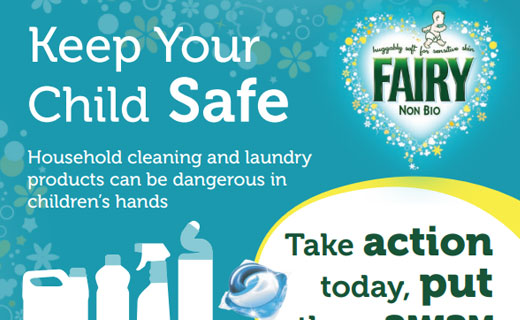
North West
Find out more about Take Action Today in the North West and how you can get involved
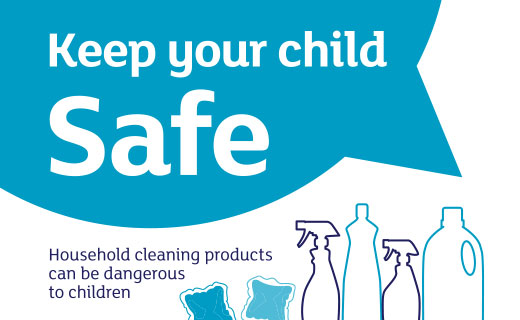
Not in the North West?
Find out more about Take Action Today in other parts of the country and how you can get involved
Find out more
Liquid Laundry Capsules - Find out more about safety with liquid laundry capsules.
View our videos on safety with household cleaning products:
Keep caps from kids
A short video explaining how you can protect your kids in the home
Poisons children find at home
Produced by Dr Nicola Ubayasiri from Nottingham University Hospial's Paediatric Emergency Department